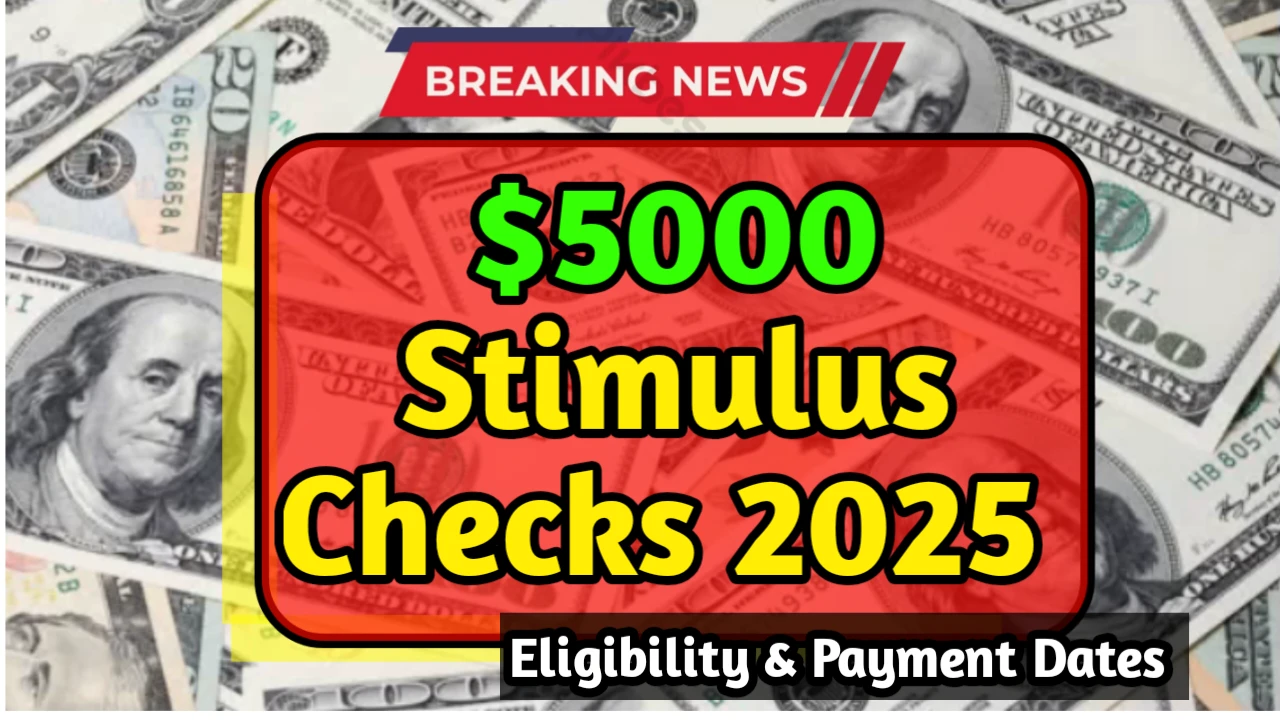$5000 DOGE Stimulus Check2025 As the global economy continues to shift and adapt in the digital era, governments and financial institutions are beginning to explore alternative methods of economic support and financial aid. One such concept gaining momentum in 2025 is the idea of a $5000 DOGE Stimulus Check. This proposed initiative centers around distributing stimulus payments in Dogecoin, a popular cryptocurrency that has experienced increased mainstream attention. In this article, we explore whether this stimulus could become a reality for everyone, who might be eligible, what the potential payment dates could look like, and how this fits into the broader context of digital economic aid.
What is the $5000 DOGE Stimulus Check?
The proposed $5000 DOGE Stimulus Check refers to a financial relief plan that suggests eligible individuals may receive $5000 worth of Dogecoin as part of an economic stimulus package. Unlike traditional cash-based stimulus programs funded by national treasuries, this approach embraces blockchain technology and decentralized finance. While no official government policy has confirmed this yet, the discussions surrounding it have sparked curiosity, excitement, and skepticism in equal measure.
This potential program is part of a broader conversation about integrating cryptocurrency into national economies. By providing financial aid through a digital asset like Dogecoin, supporters argue that it could speed up payments, reduce banking friction, and promote financial inclusion in areas underserved by traditional financial systems.
Is the Stimulus for Everyone?
The idea of universal financial assistance often brings the question: who exactly qualifies? If implemented, the $5000 DOGE Stimulus Check is expected to follow a selective eligibility structure rather than a universal one. Not every citizen or resident will automatically receive the payment. Instead, there would likely be conditions based on several socio-economic and demographic criteria.
The goal would be to target individuals most affected by inflation, job loss, or low-income circumstances. Much like previous stimulus payments during economic downturns, this aid would be designed to support people who need it most, rather than a blanket distribution to all.
Eligibility Criteria
Though exact details are speculative at this point, the expected eligibility criteria for receiving the $5000 DOGE Stimulus Check in 2025 may include:
| Criteria | Details |
|---|---|
| Residency Status | Must be a legal citizen or permanent resident of the issuing country |
| Age Requirement | Likely 18 years and above |
| Annual Income Threshold | Below a set income level (e.g., under $75,000) |
| Employment Status | Unemployed, underemployed, or affected by economic downturn |
| Tax Filing Status | Must have filed recent tax returns or have a taxpayer identification |
| official website | https://www.doge.gov/ |
| Digital Wallet Access | Must have a registered digital wallet capable of receiving DOGE |
Applicants may need to verify their identity, link their digital wallet, and meet certain financial criteria to be considered eligible.
Expected Payment Dates
As of now, no official government has released an exact date for when the $5000 DOGE Stimulus Check might begin distribution. However, if the proposal advances through legislative or financial authorities, the rollout could follow a schedule similar to past economic relief programs.
Typically, payments are distributed in phases. Initial disbursements might target those who are already receiving government aid or unemployment benefits, followed by broader groups that meet income and employment qualifications.
Anticipated timeline (if approved):
| Phase | Group | Tentative Date |
|---|---|---|
| Phase 1 | Existing aid recipients | August 2025 |
| Phase 2 | Low-income households | September 2025 |
| Phase 3 | Self-employed & freelancers | October 2025 |
| Phase 4 | Remaining eligible citizens | November–December 2025 |
Keep in mind, actual dates depend on government approval, infrastructure readiness, and market conditions.
How Will Payments Be Distributed?
For a DOGE-based stimulus program to succeed, digital infrastructure needs to be in place. Recipients would require a verified digital wallet that supports Dogecoin. Popular platforms may include mainstream crypto exchanges or government-issued digital wallets tailored to securely handle such transactions.
Governments may partner with crypto platforms to ensure seamless and secure transactions. Alongside the rollout, educational resources could be made available to help citizens understand how to receive, use, or convert their Dogecoin.
Potential Challenges and Concerns
While the idea of receiving a cryptocurrency stimulus may sound innovative, there are several concerns and logistical hurdles. These include:
- Market Volatility: Dogecoin, like other cryptocurrencies, is known for price fluctuations. The actual value of a $5000 DOGE stimulus could change rapidly based on market conditions.
- Access and Education: Not everyone is familiar with digital wallets or crypto trading. This raises concerns about inclusivity and financial literacy.
- Security Risks: Digital currency introduces cybersecurity threats. Ensuring secure transactions will be a key priority.
- Legal and Regulatory Approval: Government policies on crypto vary by country. Legalizing a crypto-based stimulus may require legislative changes.
Broader Implications of a Crypto Stimulus
A DOGE-based stimulus would represent a major shift in how financial aid is conceptualized. It signals growing acceptance of decentralized finance and could set a precedent for future policies that integrate digital currencies into public economics. If successful, it could encourage wider adoption of cryptocurrencies and transform how governments approach welfare, emergency relief, and financial empowerment.
$5000 DOGE Stimulus Check 2025: Stimulus for Everyone? Eligibility & Payment Dates
The proposed $5000 DOGE Stimulus Check in 2025 is more than just a financial aid plan—it’s a potential milestone in the fusion of digital currency with economic policy. Although it remains speculative and depends on many moving parts, its discussion reflects evolving attitudes toward cryptocurrency as a viable component of modern finance. For citizens interested in staying informed, keeping track of updates from government channels and trusted financial sources will be crucial.
As the world continues to digitize and experiment with new forms of currency, initiatives like this may become more than futuristic ideas—they might just become the new norm in economic support.






